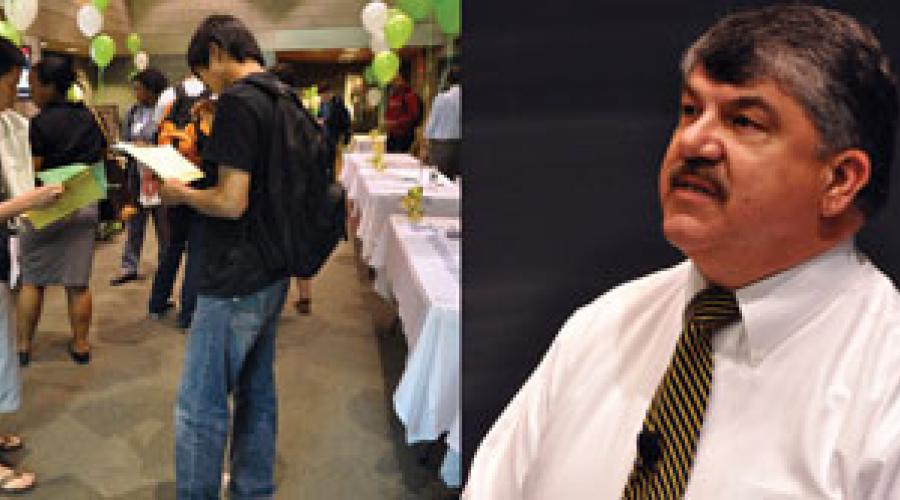
Building a Green Collar Movement
Hundreds of people attended Union Days 2010 events, highlighted by a speech where AFL-CIO President Richard L. Trumka said unions see themselves as part of the solution in building a greener economy.
"America has a huge job to do" in creating an environmentally sustainable future, he said Friday in the "Building a Green Collar Movement: Labor and the Environment" event.
Unions have the dedication, determination and skills to help the nation go green, Trumka said.
By building alliances with environmentalists and training workers to implement green technology, labor is already contributing to the movement, he said.
Green jobs will have a more robust economic impact if material for green economy infrastructure is purchased domestically, he said.
"We need to build and buy from America," said Trumka, whose address can be seen online.
At the Social Justice Career Fair held as part of Union Days, Brian Fetterolf '13 inquired about a summer internship with the Rainforest Action Network.
Experience with the organization, he said, could complement his human rights studies at ILR and his minor in natural resources at the College of Agriculture and Life Sciences.
Debra Erenberg, grassroots organizing director of the Rainforest Action Network, said she encourages students who are interested in social justice work to volunteer or do internships with non-profit groups.
Before a career in social justice, which typically pays lower salaries than for-profit industries, she said. "One key thing is to be realistic about what your needs are … a lot of it is deciding what’s important."
A graduate of George Washington University Law School, Erenberg said a social justice career is economically feasible. "I've always been able to make a living wage."
Erenberg participated in a Union Days panel discussion which included Jill Kubit, Global Labor Institute assistant director.
Kubit said, "It is imperative for the labor and environmental movements to join together with community organizations and push for a transition to a low-carbon economy."
Panelist Rick Abraham, environmental consultant to labor unions and civil rights organizations, discussed worker safety campaigns in the oil and petroleum industries.
In planning and executing the campaigns, he said, it's important to build relationships with people in the plants and to work with people in unions.
"Workers are the first exposed, and the most exposed, when there are accidents. An organized work force is the community's first line of defense against pollution and accidents," he said. "You need to change things at the bottom to change things at the top."
Panelist Leslie Moody, executive director of The Partnership for Working Families, discussed the nation’s first "Clean Truck Program" at the Port of Los Angeles.
More than 1,000 trucks were removed from service through the campaign and trucking companies became responsible for ownership and upkeep of clean-burning vehicles, she said.
The effort also led to better working conditions for drivers, Moody said.


